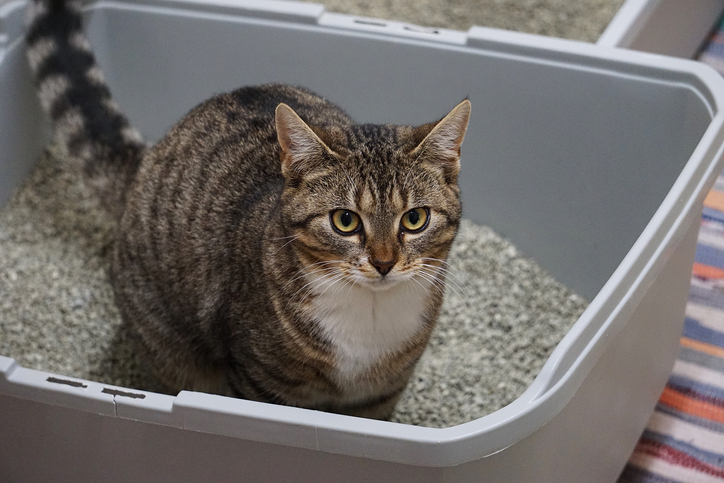Imagine this: you wake up to the smell of something decidedly un-cat-like – a sharp, ammonia-like odor emanating from the corner of your living room. Your heart sinks as your gaze falls upon a damp spot on the carpet – a clear sign your feline companion has chosen your floor as their new toilet. This is a common, but frustrating, problem that many cat owners face. And while it can be a source of anxiety, rest assured, finding the root cause of this behavior is often easier than you think.

Image: www.youtube.com
Understanding why your cat might be peeing outside of their litter box is crucial to solving the problem. This article will delve into the common reasons behind this behavior, offer strategies for addressing it, and ultimately help you restore harmony to your home.
Why is My Cat Peeing Outside the Litter Box?
Cats are notoriously clean creatures, so it seems counterintuitive that they would willingly soil their surroundings. The truth is that litter box issues aren’t usually about laziness or spite. Instead, they are often a sign that something is amiss in your cat’s world.
Medical Reasons
One of the first things to rule out is a medical condition. Urinary tract infections (UTIs), bladder stones, and even kidney disease can all lead to changes in urination habits, making your cat more likely to urinate outside the box. If your cat seems uncomfortable, cries out when they urinate, or has blood in their urine, it’s crucial to see a veterinarian right away.
Litter Box Hygiene
Cats are fastidious creatures, and they are very sensitive to the cleanliness of their litter box. If their box is not kept clean enough, they will choose an alternate location for their business. Here are some key areas to focus on:
- Frequency of Cleaning: Aim to scoop the box at least once a day, preferably more often in multi-cat households.
- Litter Type: Experiment with different types of litter to find one your cat enjoys. Some cats prefer clumping litter, while others prefer clay or even a paper-based litter.
- Location: The location of the litter box is also important. Choose a spot that is quiet, private, and accessible to your cat. Avoid placing it near noisy appliances or in high-traffic areas.

Image: heartandpaw.com
Stress and Anxiety
Just like humans, cats can experience stress and anxiety, and these feelings can lead to changes in their bathroom habits. Common triggers for cat stress include:
- New additions to the household: This could include a new pet, a new baby, or even a new piece of furniture.
- Changes in routine: Even small changes to your home or routine, such as moving furniture or rearranging the room, can stress your cat.
- Noise and commotion: Loud noises, such as construction work or loud music, can trigger anxiety in cats.
- Other cats: If you have multiple cats, competition for resources, such as litter boxes, food, or attention, can lead to stress.
Territorial Issues
Cats are very territorial animals, and they may choose to urinate outside the litter box if they feel threatened or insecure about their space. This could be caused by a number of factors, including:
- Presence of other animals: If your cat feels threatened by another cat or pet, they may pee outside the box to mark their territory.
- New people in the household: New visitors or houseguests can cause your cat to feel insecure and make them more likely to urinate outside the box.
- Changes in their environment: Moving houses, renovations, or even rearranging furniture can disrupt your cat’s sense of security and lead to territorial issues.
Underlying Behavioral Issues
Sometimes, peeing outside the box can be a sign of underlying behavioral issues, such as attention-seeking or anxiety.
- Attention-seeking: If your cat isn’t getting enough attention, they may pee outside the box to get your attention.
- Separation anxiety: Some cats experience separation anxiety when they are left alone for extended periods.
Strategies for Addressing the Problem
Now that you have a better understanding of the possible reasons behind your cat’s litter box problem, it’s time to take action. Here are some strategies you can try:
Cleanliness is Key
As we mentioned earlier, litter box hygiene is paramount. Make sure you’re cleaning the box thoroughly and frequently. Experiment with different types of litter and consider offering your cat multiple litter boxes if you have a multi-cat household.
Manage Stress
If stress or anxiety is a factor, try to make your home environment as calming as possible. Provide your cat with plenty of scratching posts, toys, and hiding places. You can also try using calming pheromone diffusers or sprays to help reduce stress.
Address Territorial Issues
If you think territorial issues are at play, ensure your cat feels safe and secure. Provide them with a dedicated space where they can retreat and feel comfortable. You may also want to consult a veterinarian or certified animal behaviorist for more specific advice.
Seek Professional Advice
It’s always a good idea to talk to your veterinarian if your cat’s peeing outside the box behavior persists. They can rule out any underlying medical conditions and recommend strategies tailored to your cat’s individual needs. In some cases, you may want to consult with a certified animal behaviorist for more specialized help.
Cat Uses Litter Box But Pees On Floor
Patience and Consistency
Most importantly, remember that it takes time and patience to address this issue. Be consistent with your efforts, and don’t give up! With a little persistence, you can help your cat regain their confidence and use their litter box reliably.
The key to success lies in understanding your cat’s needs and finding ways to create a safe, comfortable, and stimulating environment for them. Remember, your cat is not trying to punish you; they are simply responding to their environment. With a little effort, you can help your furry friend regain their bathroom manners and restore peace to your household.

:max_bytes(150000):strip_icc()/OrangeGloEverydayHardwoodFloorCleaner22oz-5a95a4dd04d1cf0037cbd59c.jpeg?w=740&resize=740,414&ssl=1)




